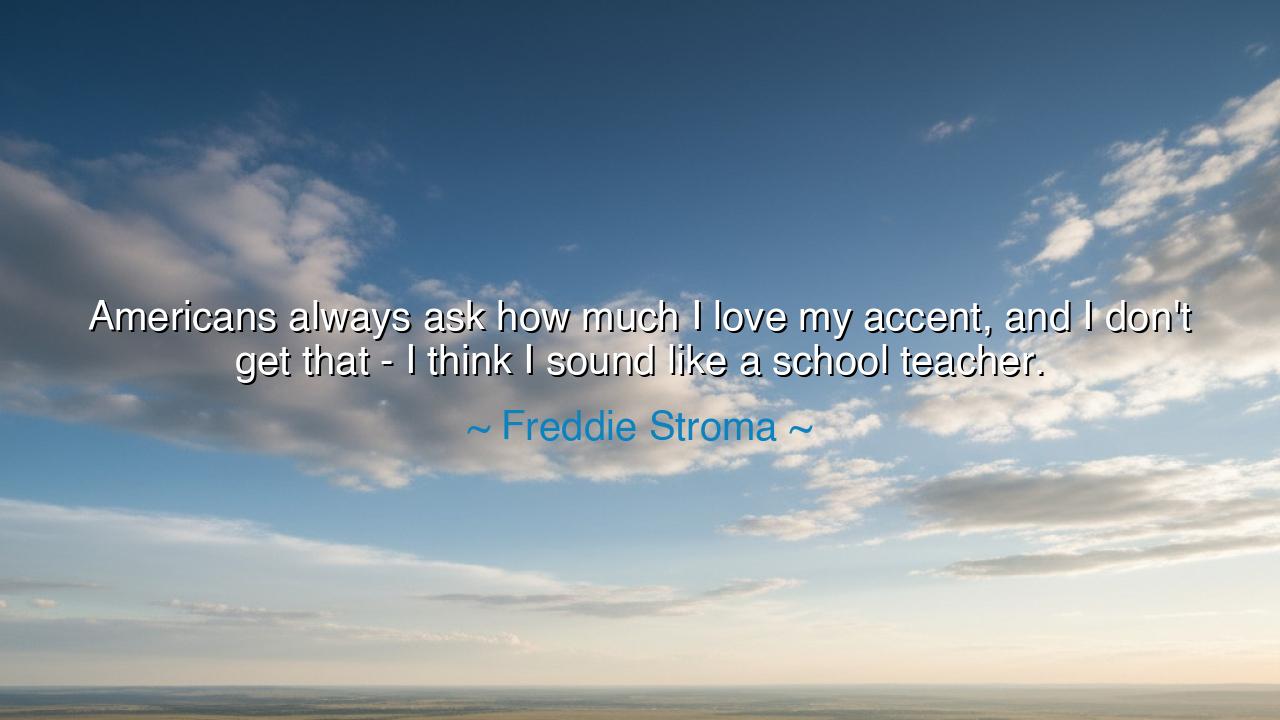
Americans always ask how much I love my accent, and I don't get
Americans always ask how much I love my accent, and I don't get that - I think I sound like a school teacher.






Freddie Stroma once remarked: “Americans always ask how much I love my accent, and I don’t get that—I think I sound like a school teacher.” At first, this may sound like a light jest, a passing comment on the way voices are perceived across cultures. Yet within it lies a deeper truth about identity, perception, and the power of language. For the accent is not merely a way of speaking; it is a symbol, a vessel of history and belonging. What sounds ordinary to one’s own ears may sound enchanting, strange, or even authoritative to another. Thus, Stroma’s words remind us of the great distance between how we see ourselves and how the world sees us.
The origin of this quote rests in the meeting of cultures. Freddie Stroma, born in Britain, carried with him the rhythm and intonation of his homeland. To him, his accent was no special jewel, no performance—it was simply his voice, the natural expression of who he was. Yet to Americans, whose ears were attuned to different cadences, his speech carried charm, elegance, and refinement. They heard in his voice something that he himself could not: an identity shaped by history, culture, and the imagination of others. This disparity between self-perception and external perception is at the heart of his reflection.
The ancients understood this paradox well. Consider how the Greeks marveled at the speech of orators. To them, the tongue of Demosthenes carried fire, though he had once struggled even to form his words. Or think of how the Romans viewed the rhetoric of the Greeks themselves: what to Athenians was ordinary speech, to Romans was high philosophy, refined and majestic. The same words, the same accents, carried different weights depending on the ear that received them. Thus, the lesson is eternal: the voice may be the same, but the meaning it carries changes with the listener.
A story from history makes this truth vivid. When Winston Churchill, with his gravelly and defiant voice, addressed Britain during the dark days of World War II, many of his countrymen heard not only a statesman but a lion. Yet to himself, Churchill often considered his speech flawed, his words labored through effort and determination. What he thought of as ordinary or imperfect became, in the ears of a nation, the sound of courage and hope. So too with Stroma: what he believes to be plain, even “like a school teacher,” is to others a symbol of charm and distinction.
The meaning of Stroma’s words is thus twofold. On one hand, they show the humility of one who does not exalt himself for what others may admire. On the other, they show us the great gulf between the inner life and the outer image. We may believe ourselves plain, unremarkable, even burdened by flaws—yet to others, those very traits may shine with beauty, wisdom, or power. What we dismiss in ourselves may be the very thing that others celebrate.
The lesson is clear: do not judge your worth only by your own mirror. The gifts you take for granted may be treasures to those around you. Your voice, your manner, your ways of being—all may seem ordinary to you, yet they may carry strength, charm, or inspiration for others. Like the accent, identity is not merely self-made, but co-shaped by how it touches the lives of others. And often, what seems small in our own eyes is great in theirs.
In practice, this means walking with humility but also with openness. Do not scorn the gifts that come naturally to you, nor cling too tightly to how you believe others should see you. Instead, let your presence be freely given, trusting that what you think of as common may be to another the very thing that brings light to their day. Speak with your true voice, act with your true heart, and let others find in you what you yourself may not see.
Therefore, remember Freddie Stroma’s insight: “Americans always ask how much I love my accent… I think I sound like a school teacher.” The world will hear in you things you cannot hear in yourself. Do not be puzzled or troubled by this mystery—embrace it. For in this lies the beauty of human life: that each of us, in being ourselves, unknowingly becomes a source of wonder, strength, or comfort to another.






AAdministratorAdministrator
Welcome, honored guests. Please leave a comment, we will respond soon